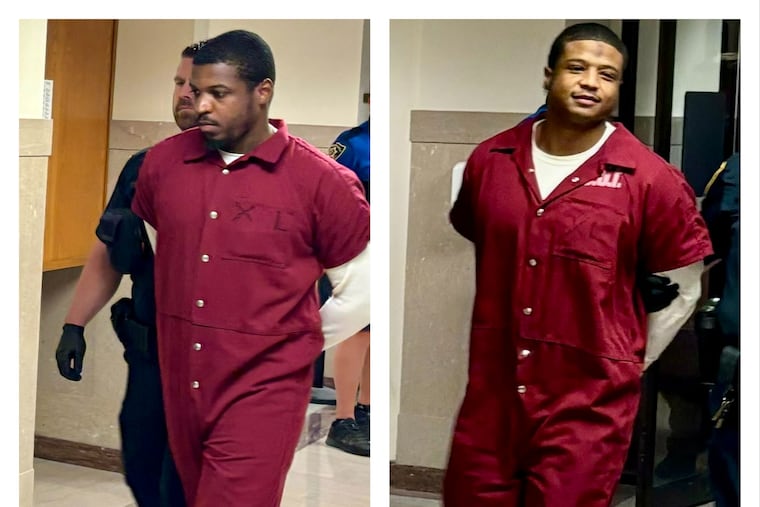Two men who plotted fatal robbery of Norristown man sentenced to life in prison
Jerry Butler and Daquan Allen were convicted Monday of second-degree murder in the death of William Carter, who was targeted over $3,000 he had won betting on sports.

Tiara James made her feelings clear Thursday to the men convicted of murdering and robbing William Carter, the father of her 1-year-old daughter.
“I know you don’t care too much what you did to William, but there are people out there who gave a [expletive] about him,” James said from the witness stand inside Montgomery County Court Judge William Carpenter’s courtroom. “That night, you took more than a cell phone from him. You took his life.”
James, holding her toddler as she spoke, asked that Jerry Butler and Daquan Allen spend as much time in prison as her daughter must spend growing up without her father, who she said was a good man who never bothered anyone.
Carpenter sentenced the men to life in prison, the mandatory sentence for second-degree murder, as well as a concurrent sentence of 7½ to 20 years for conspiracy to commit robbery.
Their attorneys, Brooks Thompson and Nicholas Reifsnyder, objected to the life sentences, referring to Commonwealth v. Derek Lee, a case being argued in state Superior Court next month that asserts such sentences are unconstitutional for people involved in fatal robberies who did not carry out the murder itself. Neither Butler nor Allen fired the shot that killed Carter.
Carpenter denied their objection, saying the Lee case has not yet changed state law.
Butler, 29, and Allen, 30, were convicted Monday of second-degree murder, robbery, and conspiracy in the death of Carter, whom Allen plotted to rob with the help of Carter’s ex-girlfriend.
Katherine Emel, Carter’s ex, initiated the robbery, according to trial testimony, because Carter had recently won $3,000 while gambling on sports and had stopped paying her for their rent and car.
Two other men participated in the robbery: Damon Brantley Jr., 18, who shot Carter to death when he tried to flee, and Justin Davis, 17, who helped attack Carter but later admitted to his crimes and testified against the three others.
The group approached Carter on Wood Street in Norristown on Jan. 20, attacking him as he left James’ house to retrieve something from his car.
Each of the three men who took the case to trial played a specific role in the robbery, prosecutors said.
Allen previously sold ecstasy to Emel and had gotten into a heated confrontation with Carter weeks before his murder, according to evidence presented at trial. Emel, 31, provided Allen with Carter’s location on the day of the murder through a GPS tracker she had placed in a Buick they shared.
Butler was the “muscle,” prosecutors said, and DNA evidence proved he rifled through Carter’s pockets during the robbery, stealing his cell phone and money.
Brantley supplied the gun and the stolen getaway car, and served as the triggerman. He was convicted of first-degree murder and will be sentenced in November. He faces anywhere from 35 years to life in state prison, because he was 17 at the time of the fatal shooting.
In June, Emel pleaded guilty to third-degree murder, robbery, and conspiracy.
At Thursday’s hearing, members of Carter’s family described him as a “beacon of kindness, resilience, and unwavering support” and said his death had “plunged [their] family into an ocean of grief.”
Assistant District Attorney Meghan Carney said afterward that the sentences handed down to Butler and Allen were appropriate, especially in light of their lengthy criminal histories for charges including drug and gun possession and robbery.
“This was someone that was a light in this family and they’re never going to see him or experience him again,” Carney said. “A life sentence should reflect what they took — a life.”